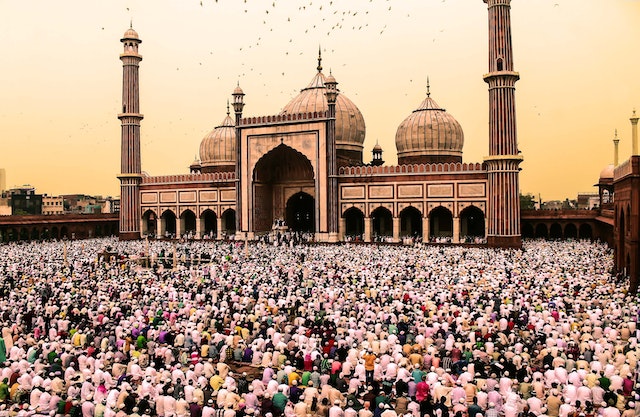
TOP 7 MUST-VISIT MOSQUES IN DELHI: A GUIDE TO SPIRITUAL EXPLORATION
The dynamic metropolis of Delhi, India, is where spirituality, culture, and history combine to create a breathtaking tapestry of experiences. The city has several magnificent mosques that exemplify architectural mastery and spiritual significance. We’ll take you on a tour of Delhi’s top 7 must-see mosques with this guide. Explore the city’s spiritual heart with this tour, which takes you from the majestic Jama Masjid to the peaceful Nizamuddin Dargah. These holy locations link to Delhi’s rich and varied past, regardless of your interest in history or quest for inner serenity.
Jama Masjid, Chandni Chowk
The Jama Masjid, located in the heart of Delhi’s crowded Chandni Chowk, is a well-known example of Mughal architecture. This exquisite mosque, built in the middle of the 17th century by Emperor Shah Jahan, exemplifies India’s rich past. The Jama Masjid is a sight to see with its lofty minarets, gorgeous calligraphy, and a vast courtyard that can accommodate over 25,000 worshippers. Ascending the minaret’s steps and being rewarded with a bird’s-eye view of Old Delhi is a photographer’s dream. Whether you’re interested in spirituality or history, a trip to Jama Masjid offers a wealthy and culturally rich look into the past.
Hazrat Nizamuddin Dargah, Nizamuddin West
Nestled in the tranquil neighborhood of Nizamuddin West, the holy shrine of Hazrat Nizamuddin Dargah exudes a mystical air in the middle of Delhi. This Sufi shrine has served as a center for peaceful cooperation and spiritual devotion to the venerated Sufi saint Hazrat Nizamuddin Auliya for decades. A very relaxed and devotional environment is created by the Dargah’s captivating qawwals, performed by skilled Sufi musicians. People from different backgrounds go there to find blessings and comfort, and it’s a place where religious lines are blurred. This place is a soul-stirring experience that serves as a beautiful reminder of the diversity of spirituality.
Fatehpuri Mosque, Chandni Chowk
The Fatehpuri Mosque, a Mughal-era architectural marvel, is tucked away amid the busy alleyways of Chandni Chowk in Delhi. This mosque, constructed by one of Emperor Shah Jahan’s wives, Fatehpuri Begum, bears witness to the city’s illustrious past. A sight to behold is its magnificent red sandstone exterior, embellished with white marble and elaborate embellishments. The peaceful interior of the mosque offers a much-needed diversion from the bustle of the marketplace outside. As a calm reminder of Delhi’s rich cultural past, Fatehpuri Mosque welcomes guests to appreciate its ageless beauty and historical significance.
Sunehri Masjid, Chandni Chowk
Nestled in the heart of Chandni Chowk, Sunehri Masjid is a hidden gem that appeals to history buffs and architecture lovers. This 18th-century wonder, sometimes referred to as the “Golden Mosque” because of its breathtaking facade with a golden color, was commissioned by Roshan-ud-Daula, the Nawab of Awadh. The most exquisite Mughal and Persian architectural influence may be seen in its elaborately decorated interiors, arched entrances, and elaborately carved minarets. With its tranquil escape from the bustling activity of Chandni Chowk, Sunehri Masjid is a great place to reflect and take in Delhi’s magnificent architectural history. Traveling here is like taking a trip back in time to see the splendor of the Mughal Empire.
Shrine Of Qutubuddin Bakhtiyar Kaki, Mehrauli
Tucked away in the peaceful premises of Mehrauli, the Shrine of Qutubuddin Bakhtiyar Kaki is a highly esteemed Sufi shrine with deep spiritual meaning. This shrine, which bears the name of the well-known Sufi saint Hazrat Qutubuddin Bakhtiyar Kaki, is a timeless example of India’s syncretic culture. People from all walks of life gather there to honor the deceased and ask for favors. The expansive courtyard offers a calm haven for reflection, and the white marble building creates peace. In addition to being a site of prayer, the Shrine of Qutubuddin Bakhtiyar Kaki represents the ongoing legacy of Sufi mysticism and Delhi’s rich historical past.
Zinat-Ul-Masjid, Ansari Road
Nestled elegantly on Ansari Road, Zinat-Ul-Masjid is a lesser-known jewel among Delhi’s colorful mosaic of mosques. This architectural marvel from the 18th century, which combines Mughal and Persian architectural elements, is a monument to the city’s rich history. Its moniker, “Jewel of Mosques,” is an apt homage to its gorgeous white marble front with arched arches and elaborate writing. The mosque, surrounded by tranquil gardens, offers a calm diversion from the bustle of the city. Zinat-Ul-Masjid is a hidden gem for anybody looking for peace in the middle of Delhi, as it provides a quiet place for spiritual contemplation and a window into the creative genius of its time.
Moth Ki Masjid, South Ex II
Moth Ki Masjid, a little-known architectural treasure tucked away in South Extension II, reveals a side of Delhi’s rich history that is rarely seen. Miyan Bhuwa, an officer in Sultan Ibrahim Lodhi’s court, commissioned this mosque in the 16th century, which combines Indian and Afghan architectural traditions. It differs from other mosques from the Mughal era with its unusual fusion of grandeur and simplicity and its very austere exterior. Moth Ki Masjid, surrounded by tranquil gardens, symbolizes Delhi’s rich cultural diversity and provides a peaceful haven for spiritual contemplation. History buffs and those looking for peace of mind are welcome to investigate this subtle jewel’s spiritual and historical importance.
Conclusion
Delhi’s mosques are examples of the city’s rich history, culture, and spirituality—a town that survives on the peaceful coexistence of the ancient and the modern. After reading “Top 7 Must-Visit Mosques in Delhi: A Guide to Spiritual Exploration,” we can see that these architectural marvels and spiritual sanctuaries provide a deep link to the city’s soul and a view into Delhi’s rich legacy. These hallowed locations call to everyone, whether they are looking for architectural wonders, quiet times, or spiritual inspiration. The mosques in Delhi capture the eternal charm of the city by serving as both a link to the past and a haven of comfort in the present.


